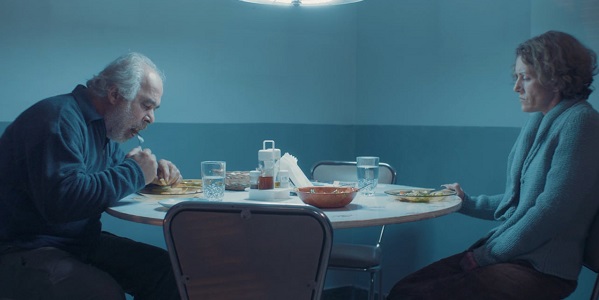PAUSE: A Soul-Crushing Lead Performance Towers Over Misery

A writer of fiction and criticism, and English student based…
You can always count on recent Greek cinema to straddle the line between bone-dry comedy and suffocating despair. With its most popular directorial export being Yorgos Lanthimos, the country by the Mediterranean could have ended up being pigeonholed by that association, when in fact there’s various ways to explore the world as Greece’s artists see it. Along comes Tonia Mishiali, a native of neighboring Cyprus, with her debut feature Pause, a dour picture of domestic oppression that has very little to laugh about.
It closely follows a turbulent few days in the life of Elpida (Stella Fyrogeni), a woman in her autumn years, trapped in a marriage that has gone beyond loveless. Her husband Costas (Andreas Vasiliou) is a boorish man who expects to be waited on, hand and foot. Their relationship hasn’t simply devolved into being more roommates than spouses, but a man and his nursemaid who he cares so little about unless she has a plate in her hand for him. As a result of her marital entrapment, unmet needs, and recent symptoms of menopause, Elpida begins to imagine lashing out against her husband violently. They give a brief moment of catharsis to her troubles, but become more complicated when it becomes hard for her to distinguish fantasy from reality.
Performance of a Woman Scorned
Saying that the film “closely follows” Elpida is far from exaggeration. She’s in every single scene and nearly every frame, which greatly attaches the audience to her character. Most importantly, it anchors us right along with the amazing performance that was given to her by Stella Fyorgeni. A dead ringer for Frances MacDormand, Fyorgeni portrays Elpida as a woman who has had enough in all her years. Her posture is defeated, and her lips are tight with restraint, as if holding in a scream or curse. Given that most of her outbursts are purely daydreamed, having such a stony appearance throughout the film only emphasizes how voiceless she is. Even in those aggressive imaginations, she loses all inhibition, showing that there likely was a strong woman behind the veneer that her domineering husband tossed on her.

A role this multi-faceted (and admittedly common) doesn’t always have a performance to complement it, which makes Fyorgeni‘s efforts rise above the rest, turning Elpida into a figure more tragic than what we were revealed. When her friend and closest confidant Eleftheria (Popi Avraam) invites her out to a night at a club, Elpida ends up singing karaoke. Such a moment is often used as an expression of freedom for a character in film, but Pause gives this scenario a sudden jolt of sadness once she listens to the words she’s singing.
They clearly strike a chord with her, referring to one’s life being half over, and upon the refrain “I forgot how to dance,” the smile she wore while belting this disco tune falters instantly, and her eyes well up.
Even with little backstory to her marriage to Costas, this reaction is especially telling of how much near social isolation has affected Elpida over a lengthy life. The only time she smiles aside from the karaoke night is when she sees her daughter and granddaughter over a Skype call, and hear least violent fantasy revolves around being kissed by a neighbor the same way he does his pregnant girlfriend.
In fact, the motif of motherhood and pregnancy appears quite often, as if a constant reminder to Elpida that she’s past her prime as the tired phrase goes. It’s this inclusion that goes to show how her life is an exclusive, but representative of the society she’s in.
Domestic Dictatorship

Returning to the appearances of pregnancy, a second reading can connect them to a reminder that Elpida has done her duty as a woman in this society. No more children, no more use except to cook and clean after her husband, a man who cares more about his parrot then the woman he was married to for decades. It was no greater creative decision towards Pause been having the bird’s constant chirping be a reminder of Elpida’s prison. It becomes more present once Costas sells her car without her permission, further confining her at home.
Elpida is a doomed woman. She mentions to her friend that the marriage to Costas was arranged, and that her first thought at the time was at least she’d be away from an overbearing father. No matter the position of the patriarchal figure, the women or girls involved are meant to follow just one path. “From one dictator to another,” Eleftheria quips.
Director Mishiali acknowledged the outcome, stating that her intent was to show the generational struggle of Greek and Cyprian women. “This passivity by women is something that has been bothering me so much,” she says. “I wanted to show the reality of the everyday lives of these women, and enter their true inner worlds.” Portraying said inner worlds of these women as one wishing for violent retribution or sexual gratification is a daring choice, but necessary if one wants to humanize those without voice.
Pause: Conclusion
Even if for all 96 minutes of Pause becoming too steeped in its sadness, the translation of Elpida’s name is a clue for what prevails. There may be an absence of comedy, dry, situational, or otherwise, but Mishiali certainly didn’t intend to squash any personal hopes and daydreams with this film. Rather, she made a film that demands them to flourish. Physical violence notwithstanding.
Have you seen this film? Would Stella Fyrogeni’s performance count among the best of the year? Leave a comment and let us know!
Pause was made available for streaming and in limited theaters on June 14.
Does content like this matter to you?
Become a Member and support film journalism. Unlock access to all of Film Inquiry`s great articles. Join a community of like-minded readers who are passionate about cinema - get access to our private members Network, give back to independent filmmakers, and more.
A writer of fiction and criticism, and English student based in Baltimore. Berry’s aspirations of becoming an animator/filmmaker started young. It was a high school film studies course that shifted their interest to wanting to discuss them. They maintain a growing list of favorite films, ranging from Ingmar Bergman’s Persona to Stephen King’s Maximum Overdrive.













